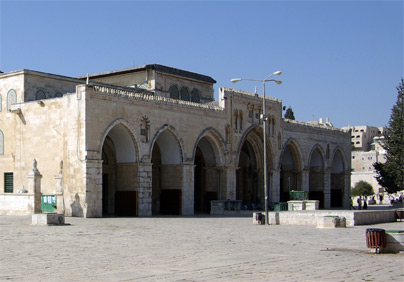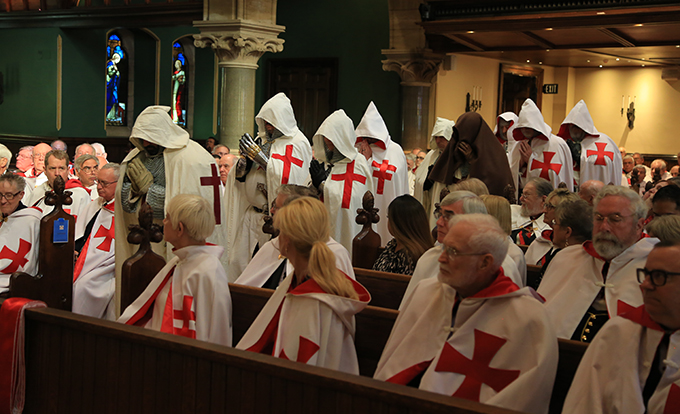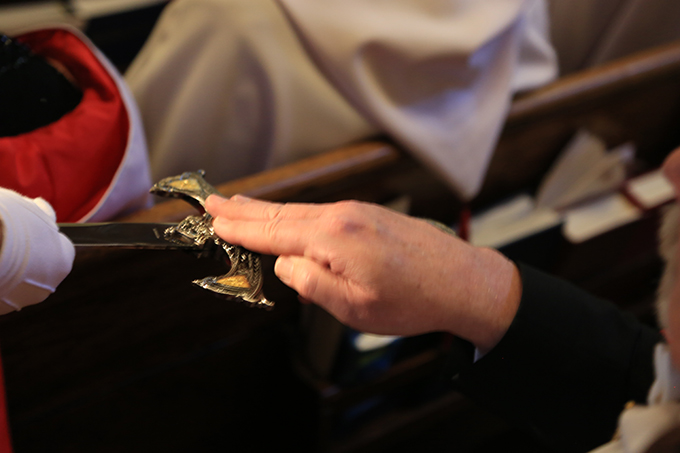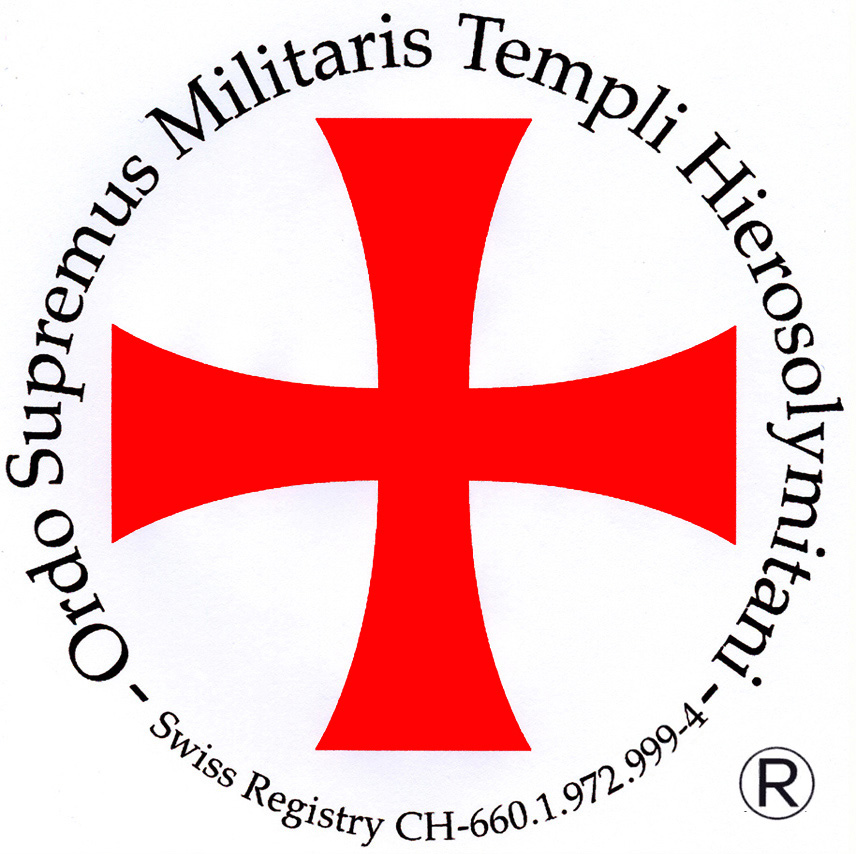Approach
At the international level, the Focus of the Order is the scope of humanitarian issues arising from the Holy Land and its environment (OSMTH Intl. Grand Council, Rome, Italy, November 2001).
This rather broad definition can be explained as follows. The Role of the medieval Order of the Knights Templar was essentially one of defence: to protect pilgrims on the way to the Holy Land. The present Order -- drawing on the legacy of the original medieval Order -- is concerned about issues of Peace and Tolerance, and is particularly concerned about those interethnic and interreligious conflicts that are tormenting the Holy Land specifically and the Middle East in general. We are further concerned about the heavy repercussions that the Christian-Muslim-Jewish conflicts seem to have world-wide. The prevention and resolution of this type of conflict, in the Middle East and elsewhere, is of paramount importance to the Order, as well as the the relief of people affected by such conflicts.
This rather broad definition can be explained as follows. The Role of the medieval Order of the Knights Templar was essentially one of defence: to protect pilgrims on the way to the Holy Land. The present Order -- drawing on the legacy of the original medieval Order -- is concerned about issues of Peace and Tolerance, and is particularly concerned about those interethnic and interreligious conflicts that are tormenting the Holy Land specifically and the Middle East in general. We are further concerned about the heavy repercussions that the Christian-Muslim-Jewish conflicts seem to have world-wide. The prevention and resolution of this type of conflict, in the Middle East and elsewhere, is of paramount importance to the Order, as well as the the relief of people affected by such conflicts.
- OSMTH concentrates on Peace Education efforts.
The Order organizes lectures and publications on human rights and tolerance. This site provides information on the Order for members and non-members alike, especially through the online publication "Carpe Diem" and through the section "ad hoc articles." This literature offers information and commentaries on subjects dear to every Templar's heart: Peace, human rights, religion, humanism, tolerance, future of mankind etc. A prominent example is the "Law of War Vademecum," a concise but precise manual on the basic principles of humanitarian law, for use in the armed forces and schools.
The Order also organizes, in collaboration with the partner organization "Center for Religion and Diplomacy," reconciliation workshops for Clerics of different religions, the first of which was between Muslim and Christian clerics in Sudan, where the relationship between the two religious communities are notoriously appalling. The Center for Religion and Diplomacy," founded by one of the Order's members, studies the conflicts in several regions of the world and analyzes the impact that religion has had in fomenting the conflict, and the chances religion could have in conflict transformation, peace-making, and more generally in diplomatic efforts
. - OSMTH joins humanitarian efforts
But preaching about Peace and Tolerance is not enough. Practical demonstration that people care, and they can care regardless of religious, national and political barriers, is sorely needed.
The Order has delivered food and essential goods to the people of Afghanistan on two occasions since the tragic events of September 11. Currently, schools are being funded and organized in underserved areas of Afghanistan, with the collaboration of Prince Ali of Afghanistan.
The Order is also active in the provision of medical expertise and equipment. Medical equipment has been delivered (and is still being delivered) in Eastern Europe and Africa, with a special focus on Rumania and Ethiopia, including regions inhabited by Muslim minorities. The Order has also organized a conference at ministerial level of chief medical officers of the Baltic Countries to tackle the rising and frigthening problem of communicable diseases (particularly AIDS and multi-drug resistant tubercolosis in the Armed Forces and Prisons. A train comprising a travelling clinic and chapel has been equipped for the benefit of underserved people of Northern Russia and Siberia. An interdenominational school for children of all ethnic and religious backgrounds, run by the Lutheran Church in Jerusalem, also benefits from our support, especially in the current trouble times.
- The Grass Root Approach
One step further down, Grand Priories, Priories and Commanderies all engage in a number of charitable activities according to their possibilities. Typical chritable efforts include the support of youth groups to prevent criminalization of inner city children, educational projects (e.g., "Wiener Kindertheater," Austria; Peace education lectures in French High Schools), support of schools and hospitals and other institutions of public interest in the Middle East, often through established channels of the Orthodox, Catholic, Lutheran or Anglican churches. Religious leaders have been aided to reach conflict zones (Kosovo) to start mediation efforts, and action has been taken under the OSMTH banner to prevent human rights abuse (again, in Kosovo). An important initiative is the "Silent Knight Program," where individual members of the Order engage themselves anonymously in "random acts of charity" and train youth to do the same. Finally, let us not underestimate the power of the individual. Every member is expected to contribute to the life and activities of the Order according to his or her talent and possibilities. Membership must not become a burden, but there are many ways in which members can serve the Order with a bit of creativity. Personal initiative, if leading to projects fitting in the overall framework of the Order's mission, are encouraged and supported. In fact, they are an abiding characteristic of the Templar spirit.
| Registration Notice: Sovereign Military Order Temple of Jerusalem (OSMTH) is a United Nations Non-Governmental Organization (NGO) registered in Geneva, Switzerland. Swiss Federal Registry Number CH-660.1.972.999-4 |
There are more then 1700 groups in the world calling themselves 'Templars' or 'Knights Templar' which is a name they can freely use. OSMTH (Sovereign Military Order of the Temple of Jerusalem) however is not associated with any one of them and our Logos and Coat of Arms are protected by trademark registration. | At OSMTH we care about your privacy. In response to the European Union’s General Data Protection Regulation (GDPR), we have reviewed our policies and procedures to ensure that we conduct our operations in line with your fundamental right to have your personal data collected only when, and for as long as necessary and to keep it well protected. |
 About OSMTH
About OSMTH






